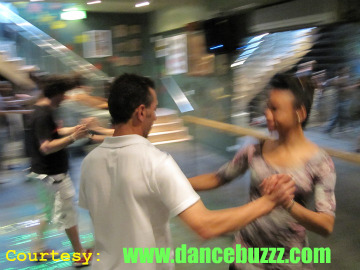|
Brazilian Dance Music.Let's find out what the Brazilian dance tells us.Oi, e aí? Vamos dançar? (shall we dance?) 
Today we are going to talk about Brazilian dance music. Every time you hear the word Brazil, usually a few things pop straight into your mind - Brazilian dance music (like Samba), football, and Carnival... Music and dance are undoubtedly some of the most powerful forms of expressions of the Brazilian culture translated into colours and emotions of its movement. There are a number of dance styles that can dance around Brazil and this represents one of most popular ways of social entertainment for the locals all over Brazil. Indeed Brazilian dance music is part of Brazil and the Brazilian culture. There are many kinds of dance and music in Brazil. The most popular dances and types of music in Brazil are: Depending on the region you are, some dances and some types of music are more popular than others. But something you can get for granted: in Brazil you can dance a lot! Apart from a variety of samba styles, dance solo or with a partner, Forro, Bolero and Zouk are some of the alternative preferred styles of Brazilian dance music. The dance schools in Brazil organise "bailes" on a regular basis where people go to dance, socialise and make friends! Brazilian Zouk (in Brazil called just Zouk) is the face of contemporary Brazil as it can be danced to large variety of music including R&B, Pop, Latin and Middle Eastern sounds. Brazilian Zouk is a 100% Brazilian dance. It's sensual, elegant and beautiful to watch. It is truly captivating and, apart from Brazil, is very popular around Europe, Australia and USA. Check this out: Nice, isn't it? Wow! Está-me apetecendo dançar agora!... (I feel like dancing just now!...) Let me tell you a story: Because I'm so passionate about all these cultural events, a few months ago I joined a Meetup.com group in London - London English-Portuguese Language exchange Meetup. Actually this is a very good idea for you if you want to meet people to exchange language skills. Yes, go to Meetup.com and find a group near you, where you can meet people who are interested in exchanging Portuguese for your language. But, as I was saying, I met there (along many of those meetups) very interesting people from whom I learn a lot. I had the pleasure to meet Nataliya - a dance teacher and entrepreneur that dedicates her life to Brazilian dance music. She taught me a lot about dance. She even taught me some steps! I loved it! But you know what? She can teach you too! If you are in London, you can learn how to dance Brazilian Zouk and Brazilian Samba too. Come and enjoy the "bailes" organised by Dancebuzzz. It's like being in Brazil! Amazing! Check the website www.dancebuzzz.com for more info on where and when you can immerse yourself in the Brazilian rhythms, make new friends, get fit and even practice your Brazilian Portuguese. ;-) Quite often I'm there too to enjoy some good company and Brazilian dance music. So come to meet and talk to us. Just to give you an idea about how passionate the Brazilians are for their dance, I have to compare it with other cultures. For instance, in the USA or in the UK people go out at night to have a drink or to socialize. In Brazil people go out just to dance. Can you believe it? Obviously they end up meeting many people too, but the main reason for them to go out is to have a dance. Also, as Gannon, M.J. and Pillai (in "Understanding Global Cultures. Metaphorical Journeys Through 29 Nations, Clusters of Nations, Continents, and Diversity, Thousand Oaks: Sage Publications) says "it is not unusual for Brazilian factory workers to spend a month's salary on the costumes they will wear at the carnival parade." Without a doubt Brazilian dance and Brazilian dance music is something that unites this highly fragmented nation - Brazil. Samba movements translated into motions and small steps can be compared to Brazilian history and the way the nation operates as a whole. For instance it is easy in Brazil to "dance" around the rules, regulations and bureaucracy. Brazil's history is also very circular and moves in small steps like Samba. Once someone says to me: "Samba is a way for Brazilians to escape from the trials and tribulations of every-day's life". I couldn't agree more. I hope you have enjoyed this page as much as I enjoyed writing it. :-) Aquele abraço! Rafael Tavares Go Back From Brazilian Dance Music To Brazilian Culture.
|
Hey!
Do you feel like giving?
If so, please click on the "Donate" button below to help me keep this website running.
Muito obrigado!
(Thank you so much!)
And Have You Signed Up For My Free Newsletter Yet?
The Language Lover's Guide To Learning Portuguese is a study companion for you to understand the intricacies of the Portuguese Language. Check it out here!
Subscribe above
Right Now!
Click here to learn more about Rafa's Newsletter.
Here are some pages you may find interesting:
- c) Possessives





